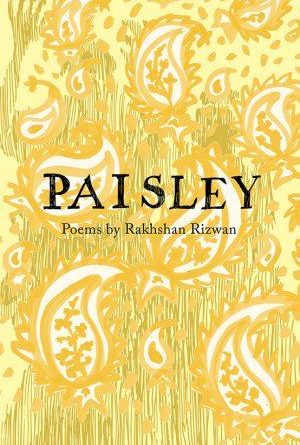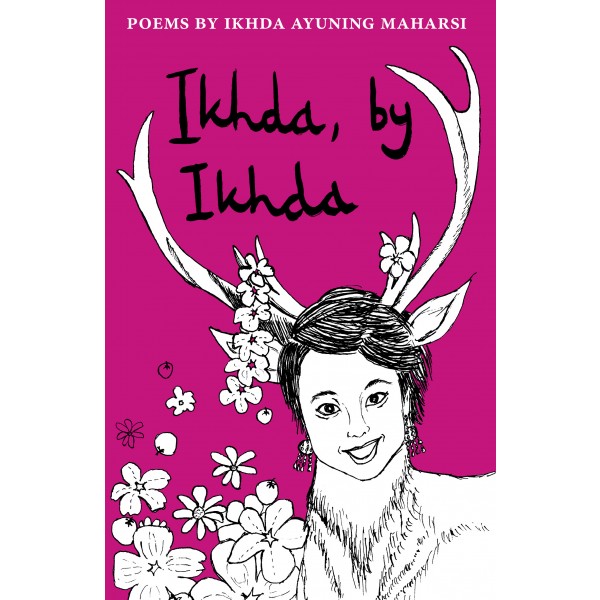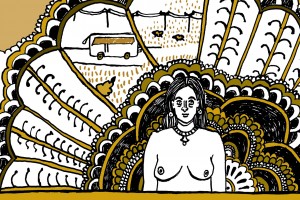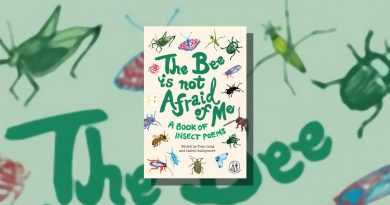Paisley by Rakhshan Rizwan
-Reviewed by Phoebe Walker-
In her debut pamphlet Paisley, Rakhsan Rizwan impresses with an alert and peripatetic poetic consciousness. Drawing on the cultural and linguistic landscape of Pakistan, now filtered through an expat’s lens, these poems explore the complexities of defining and defending cultural identity, often contrasted against a Western European backdrop that is at best aloof, at worst openly hostile.
The idea of home, a concept familiar to many explorations of identity, recurs throughout the collection, though the writing is sharp enough to ensure that it never becomes a hackneyed theme. An early poem, ‘Partition’, illuminates the unreliability of memory in shaping our origin stories. In one frame of mind, familiar speech becomes “quaint”, shading to “cloying”, elsewhere the language of another time, another place strikes the present listener like “savoury sweetmeats that a traveller brings back,/ wrapped in an oily newspaper”. The whisper of nausea that accompanies such phrases speaks of distress rather than distaste, hinting at the complexities that belie the sense of dual belonging-and-not-belonging – citizen of multiple spaces. Elsewhere, the voice is more plaintive, more wistful, as in the poem ‘Noon’:
My mother gave me this strange name – not to
punish – European tongues – but
because it tasted sweet to her tongue
The physical shape (and taste) of language, as well as its abstract resonances, takes on a new significance. This is seen perhaps most clearly in Rizwan’s assured use of the ghazal in poems such as ‘Urdu/ Hindi’ and ‘Speech Therapy’, where the form lends itself particularly well to Paisley’s overarching dialectic.
Elsewhere, some of the most striking poems contrast the impulse to engage with the prickly dismissal of the unfamiliar. In ‘Migrant’, the speaker tells us that “Their patience with me/ wears thin, the length of a blade/ of grass […] Eyes slant/ when they see me/ lips are pursed”. That cold-shouldering of anything even slightly outside the usual – in this case, a woman tackling the bureaucracy of a new country – is figured in this poem as a series of micro-aggressions. In a later poem, ‘Europe’, Rizwan reminds us of the brutal consequences of normalized prejudice, and points up the hypocrisy of intolerance. In this poem, “they” are pictured ”re-arranging the manuscripts,/ burning the libraries […] rounding up the Sikh gurus […] and driving them/ to the precipice of history”. The figure of Europa, her “long, blonde hair” trailing, is invoked, as
She supervises the undigging, the constant
unexcavating
The Western imperialist narrative of exploration and discovery becomes, conversely, a pageant of benighted acts, a chequered and arbitrary burial where only certain, choice objects – “the unleaning tower, and Picassos’ Guernica” – are deemed worthy of preservation.
Identity politics isn’t confined to nationality, of course, there is an eloquent feminist tone at work throughout the collection, which again works to confound pat readings of what it means to be ‘at home’. ‘Eve’, a prose poem, begins with “the misplaced smiles of acid-corroded faces […] the paisley motifs of child brides”, and ends:
I hold in my palms colourful vials of women’s
humiliation, their redolent tragedies. Hurt them? We are the
inheritors of Sufi poets, Moghul artisans. We worship women.
It is these feminists who want to Westernize our women and
destroy our happy families.
The self-proclaimed inheritors and artisans have the last word – they expect to – but it is crucially undermined by the quiet pressure of the poems’ preceding images, reduced to a defensive bleat in which poetry, too, is complicit.
These poems tell us that an intimately-known culture can also be at once something to cherish and to censure – and where does that leave us, overall? Perhaps in the uneasy in-between space of ‘Dreamscapes’, where the city recedes from above:
it moves
out of focus; grey smog begins to envelop
the scene like a pool of amnesia[…]
The pattern is lost forever
The city is reduced to “an assortment/ of hallucinations” – and this isn’t an unfamiliar idea, that the city to the dispossessed, modern mind, is unreal. Paisley pushes that narrative further, into a world where restless populations disperse themselves beyond the reach of any defining locus, real or imagined.





